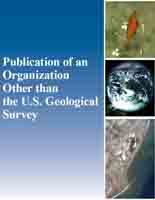Perfluorooctanesulfonate adversely affects a mayfly (Neocloeon triangulifer) at environmentally realistic concentrations
Links
- More information: Publisher Index Page (via DOI)
- Data Release: USGS data release - Acute and chronic toxicity of two perfluoroalkyl substances to Neocloeon triangulifer
- Download citation as: RIS | Dublin Core
Abstract
Of the emerging contaminant types thought to threaten freshwater biota, per- and polyfluoroalkyl substances appear to be particularly widespread, and limited studies conducted with these compounds thus far indicate insects may be particularly sensitive to them. This study investigated the short- and long-term effects of two commonly detected compounds on the laboratory-reared mayfly Neocloeon triangulifer in water only exposures. In acute tests, the mayfly was approximately 85-fold more sensitive to perfluorooctanesulfonate (PFOS) and 7-fold more sensitive to perfluorooctanoic acid (PFOA) than the next most sensitive species reported in the literature. In 14 day and full-life chronic PFOS toxicity tests, the lowest 10% effect concentration was 0.272 μg of PFOS/L, which is lower than any previous reports to the best of our knowledge, but consistent in demonstrating the sensitivity of insects to this compound. Conversely, N. triangulifer was not particularly chronically sensitive to PFOA. This study demonstrates the risks of environmentally relevant concentrations of PFOS to a freshwater insect and suggests that investigation of the toxicity of more compounds with different carbon-chain lengths and functional groups to freshwater insects is needed.
Suggested Citation
Soucek, D.J., Consbrock, R.A., Pulster, E.L., Perrotta, B., Walters, D., Steevens, J.A., 2023, Perfluorooctanesulfonate adversely affects a mayfly (Neocloeon triangulifer) at environmentally realistic concentrations: Environmental Science & Technology Letters, v. 10, no. 3, p. 254-259, https://doi.org/10.1021/acs.estlett.3c00056.
ISSN: 2328-8930 (online)
| Publication type | Article |
|---|---|
| Publication Subtype | Journal Article |
| Title | Perfluorooctanesulfonate adversely affects a mayfly (Neocloeon triangulifer) at environmentally realistic concentrations |
| Series title | Environmental Science & Technology Letters |
| DOI | 10.1021/acs.estlett.3c00056 |
| Volume | 10 |
| Issue | 3 |
| Publication Date | March 02, 2023 |
| Year Published | 2023 |
| Language | English |
| Publisher | American Chemical Society |
| Contributing office(s) | Columbia Environmental Research Center |
| Description | 6 p. |
| First page | 254 |
| Last page | 259 |


